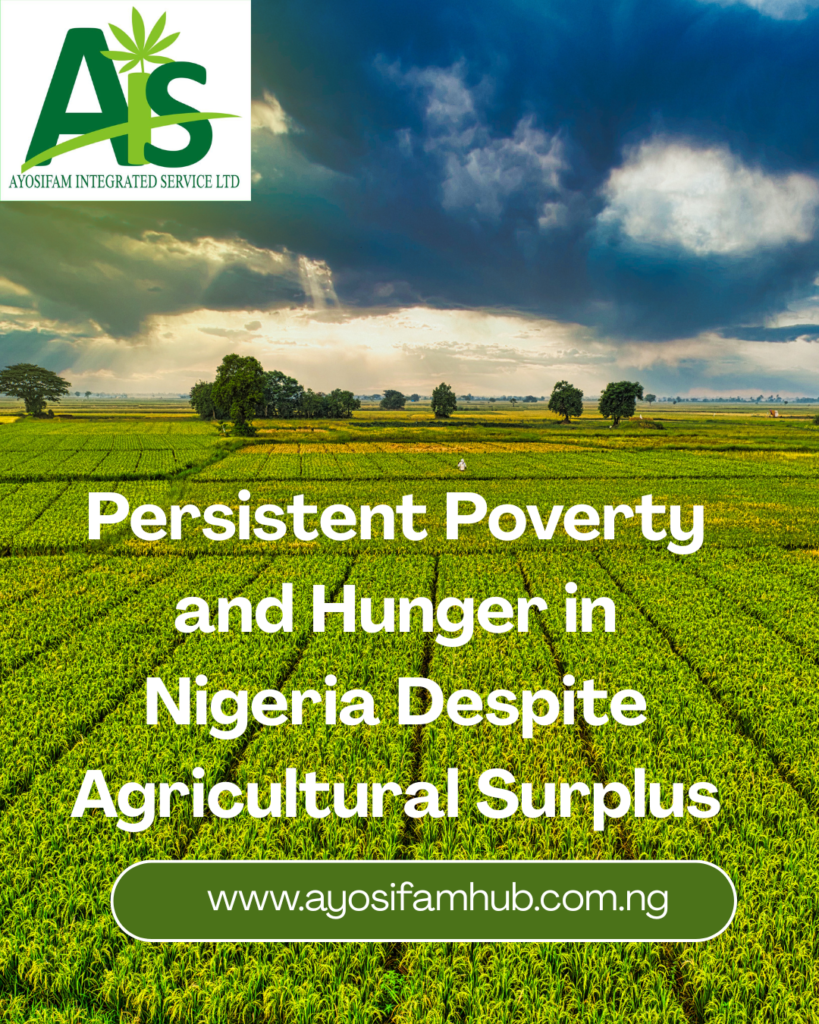
Despite a significant surplus of 668.34bn Naira in agricultural exports over imports, as seen in Q1 2025 foreign trade data, poverty and hunger remain pressing issues in Nigeria. This paradox is particularly evident in the cassava sector, where Nigeria is a leading producer yet struggles with poor market access. Here are five key reasons why this situation persists:
- Inefficient Value Chains and Post-Harvest Losses: A large portion of agricultural produce, including cassava, never makes it to market due to inadequate storage facilities, poor transportation infrastructure, and inefficient processing capabilities. Significant post-harvest losses mean that the actual food available for consumption is far less than the harvest, contributing to food insecurity despite high production volumes. For cassava, this often leads to spoilage before it can be processed or sold, especially in remote farming communities.
- Lack of Market Access and Poor Pricing for Farmers: Many smallholder farmers, who constitute the majority of agricultural producers, lack direct access to formal markets. They often rely on middlemen who offer low prices, limiting farmers’ income and their ability to invest in better farming practices or expand production. For cassava farmers, even with high yields, the inability to sell their produce at fair prices or to find consistent buyers makes farming unprofitable and perpetuates poverty.
A key initiative trying to address this challenge is AyosifamHub, which aims to create a viable market for smallholder cassava farmers by linking them directly with processors. However, a significant hurdle for AyosifamHub, particularly in Kwara State where it operates, is the scarcity of large-scale cassava processing companies. Indeed, Ayosifam, the parent company of AyosifamHub, can currently only process a modest 2 tons of cassava per day despite the abundant supply from farmers. This limited processing capacity highlights a critical bottleneck in the value chain. Therefore, sustained investment from both government and private investors is crucial to develop and scale up cassava processing facilities, thereby creating reliable off-take markets for farmers and unlocking the full potential of Nigeria’s cassava production. - Insecurity and Conflict: Persistent insecurity, including banditry, kidnapping, and communal clashes in many agricultural regions, disrupts farming activities, displaces farmers, and limits access to farmlands. This reduces overall production, increases food prices due to scarcity, and prevents farmers from fully benefiting from their harvests, directly impacting food availability and exacerbating hunger.
- Climate Change and Environmental Degradation: Nigeria is increasingly susceptible to the impacts of climate change, including unpredictable rainfall, droughts, and floods. These extreme weather events severely affect crop yields, leading to food shortages and income instability for farmers. Environmental degradation, such as soil erosion and desertification, further reduces arable land, making it harder to sustain agricultural output necessary to feed a growing population.
- Limited Processing and Diversification: While Nigeria produces a lot of raw agricultural commodities, there’s a significant gap in local processing and value addition. For cassava, instead of transforming it into various high-value products (like starch, flour, or industrial ethanol) that have stable markets, much of it is sold in its raw form, which is perishable and commands lower prices. This limits opportunities for economic growth within the agricultural sector and keeps many engaged in low-income, undiversified farming practices.



